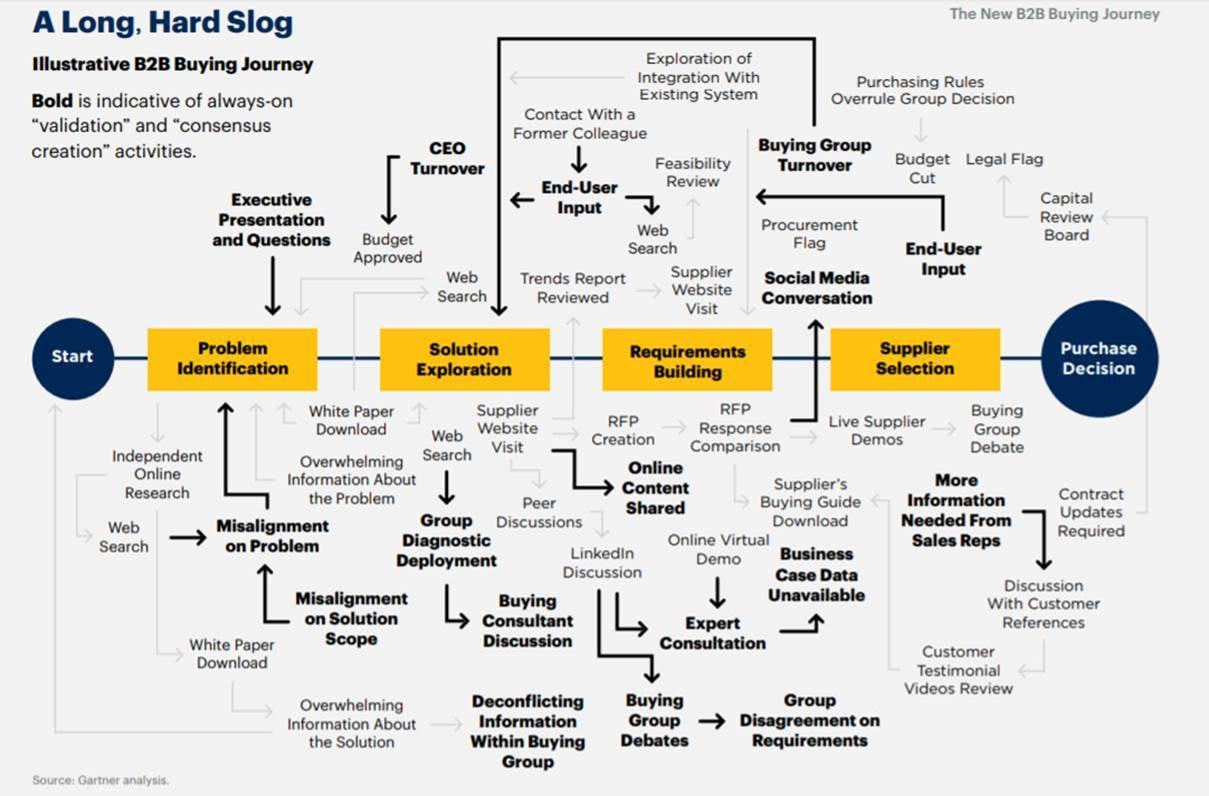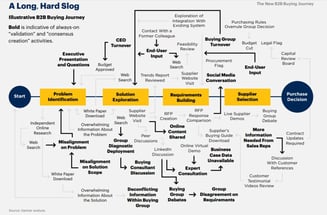Successful Selling = Intelligent Choices, not Fixed Formulas
February 12, 2019

 I’ve just spent a few minutes completing the annual survey from one of the world’s most widely respected sales training organisations. Of course, I haven’t yet seen the results, but I was intrigued by the implications behind a number of the questions.
I’ve just spent a few minutes completing the annual survey from one of the world’s most widely respected sales training organisations. Of course, I haven’t yet seen the results, but I was intrigued by the implications behind a number of the questions.
There appeared to be a strong implied endorsement of the value of adopting a structured sales process – a theme that is promoted by many of the established sales methodologies. But I’ve come to believe that this is now an outdated approach, particularly if taken to extremes.
In fact, the very word process is unhelpful. It implies linearity and a “production-line” approach to selling - which as any observer of complex buying decisions will know is completely at odds with how typical buying decisions are actually made...
Non-linearity is the true reality
As Gartner recently pointed out, significant B2B buying decisions are inherently non-linear and sometimes verging on the chaotic - you've only got to look at the image above. Customers often revisit previous assumptions, loop back to previous phases and re-evaluate what they are looking for based on changing circumstances and perspectives, or the introduction of new and opinionated members of the decision team.
Assuming that our customer has a clearly-defined buying process often proves to be a serious error, as does assuming that our initial qualification (assuming that we actually conducted some measure of formal qualification) remains valid for the duration of their buying journey.
I’m not suggesting that we descend to fighting chaos with chaos, or that we ignore the opportunity to significantly improve our sales performance through the application of effective practices and proven winning habits – simply that we should be thinking in terms of flexible frameworks, rather than rigid linear processes.
Rather than fixed formulas, rigid processes or inflexible methodologies, we should be thinking in terms of helping our sales people to make intelligent choices based on a thoughtful appraisal of the customer’s situation and the dynamics of their buying journey.
That, of course, turns out to be how the most successful sales people tend to sell anyway. They demonstrate situational fluency. They avoid relying on untested assumptions. They take steps to fill in the blanks in their knowledge. They know that they should never rely on the face value of anything they are told.
Avoiding ignorance and ineptitude
And while their strategy and execution may not be perfect, they tend to make fewer errors than their less-effective colleagues. Atul Gawande, in his hugely influential “Checklist Manifesto”, referred to the two primary causes of knowledge-related failure as errors of ignorance and errors of ineptitude.
Errors of ignorance relate to information that exists, but which we failed to uncover. This is primarily a function of ineffective conversation, questioning and listening techniques, and these are and should not be left to acts of randomness.
Successful sales people suffer fewer errors of ignorance because they prepare more effectively for every sales conversation, and because they have better conversations with their customers. This is not - as you might think from some sales methodologies - exclusively about asking the right questions.
They also listen and interpret more effectively. Rather than focusing on the answers they are hoping to hear, they are looking for the meaning and intent that lies behind what the customer is saying. They have a plan for where they hope the conversation will go but are also prepared to adapt it in the light of what they have just heard.
Errors of ineptitude relate to information that already exists somewhere in the system but has not been applied. One of the characteristics of the most effective sales people is their ability to learn from the past, to recognise patterns, and to leverage the experiences they have accumulated over time.
This is, of course, even more powerful when applied at an organisational level – by sharing pragmatic experiences of what works and what doesn’t across the entire sales population, as part of a flexible sales framework the reflects the accumulated (and continuously) evolving experience of everybody involved.
A customer-centric perspective
Rather than promoting our “sales process” we need to be coaching and equipping our sales teams to diagnose the customer’s situation, their motivations, and what phase they are in with regard to their decision-making journey.
Rather than implying linearity, we need to equip our sales people to have value-creating conversations and to apply the sales strategies and tactics that are relevant to the customer’s actual situation.
We can do this through playbooks and sales frameworks that allow our sales people to access situationally relevant sales tools and buying enablers and encourage them to think for themselves, rather than relying on following a fixed regime.
One of the most obvious considerations is whether the customer thinks of their exercise as a well-understood and familiar transactional process (in which case we need to make their task as friction-free as possible) or an unfamiliar and significant strategic decision (in which case we need to help them fully understand all the implications).
Our guidance needs to take the form of a supportive and flexible skeleton rather than a rigid and unyielding cage or shell. And we need to establish mechanisms that allow and encourage sales people to share their latest learnings with each other.
Learning, adapting and evolving
It probably hasn’t escaped your notice that this implies a significant amount of emotional intelligence, domain expertise and business acumen on the part of our sales people. And yes, some sales people who appear to have been historically successful might struggle to keep up with these demands.
In today’s world, 20 years of the same sales experience repeated every year is far less valuable than a much shorter period of active and progressive learning. Attitude and aptitude invariably turn out to be far more accurate predictors of future sales success than an apparently impressive CV.
We need to hire for these qualities. We need to train for these qualities. We need to recruit people who are capable of thinking for themselves and encourage them. We need to establish supporting systems that guide them in making situationally-appropriate choices rather than following a fixed formula.
Some of our existing sales people will relish the challenge. Others will never be able to make it. And a significant number of middle-of-the-road sales people, armed with the right attitudes and supported by the appropriate encouragement and guidance, will show us that they are capable of doing better than any of us might have thought possible.
ABOUT THE AUTHOR
 Bob Apollo is a Fellow of the Association of Professional Sales, a member of the Sales Enablement Society, a regular contributor to the International Journal of Sales Transformation and the Sales Experts Channel and the founder of Inflexion-Point Strategy Partners, the leading UK-based B2B value-selling experts.
Bob Apollo is a Fellow of the Association of Professional Sales, a member of the Sales Enablement Society, a regular contributor to the International Journal of Sales Transformation and the Sales Experts Channel and the founder of Inflexion-Point Strategy Partners, the leading UK-based B2B value-selling experts.
Following a successful corporate career spanning start-ups, scale-ups and market leaders, Bob is now relishing his role as a pro-active advisor, coach and trainer to high-potential B2B-focused sales organisations, systematically enabling them to transform their sales effectiveness by adopting the proven principles of value-based selling.


Comments